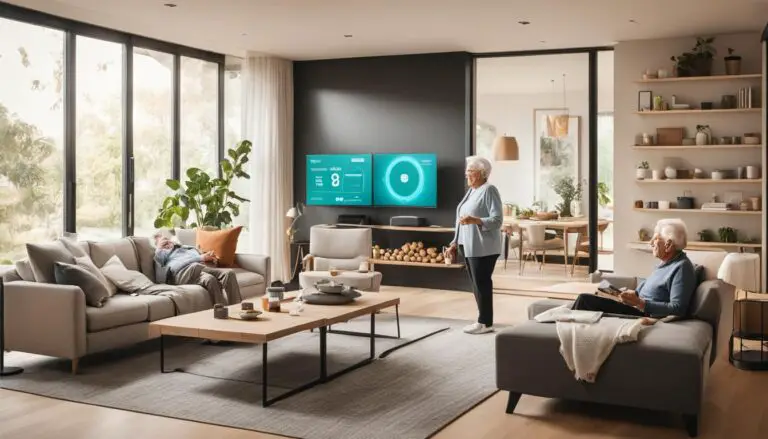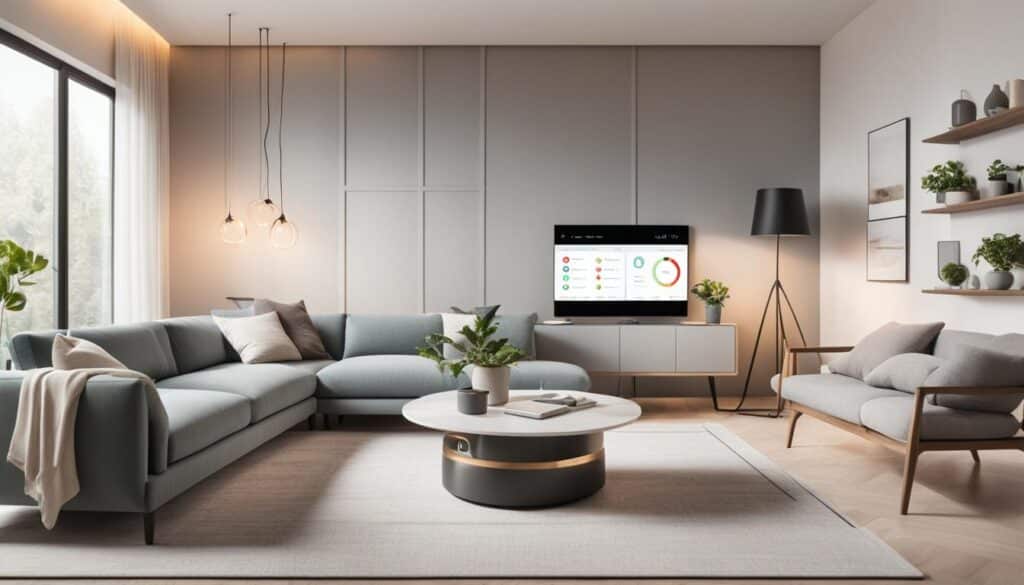Welcome to the future of healthcare where your home becomes a personal health hub. With the integration of smart technology and advanced sensors, health monitoring in smart homes is transforming the way we take care of our well-being. Now, you can monitor your health in real-time, receive proactive wellness suggestions, and access personalized care right from the comfort of your own home.
Key Takeaways:
- Health monitoring in smart homes allows continuous monitoring of vital signs and early detection of potential health issues.
- It enables remote health management, making it easier for healthcare providers to offer personalized care to patients, especially those with chronic conditions.
- Smart home devices such as smartwatches, fitness trackers, and sleep trackers play a crucial role in health monitoring.
- Artificial intelligence (AI) analyzes data from smart home devices to provide valuable insights into an individual’s health.
- Privacy and security considerations are important when adopting health monitoring in smart homes.
The Benefits of Health Monitoring in Smart Homes
Health monitoring in smart homes offers a multitude of benefits. Firstly, it provides continuous monitoring of vital signs such as heart rate, blood pressure, and sleep patterns, allowing early detection of any potential health issues.
Secondly, it enables remote health management, making it easier for healthcare providers to monitor and offer personalized care to patients, especially those with chronic conditions. Through secure data transmission, healthcare professionals can access real-time health data from their patients’ smart home devices, allowing for proactive interventions and timely healthcare delivery. This remote monitoring capability reduces the need for frequent in-person visits, saving time and costs for both patients and healthcare providers.
Lastly, health monitoring in smart homes empowers individuals to take control of their health and make informed decisions based on the data collected by the smart home devices. By having access to real-time and historical health data, individuals can track their progress, set health goals, and make necessary adjustments to their lifestyle. This increased self-awareness and engagement in personal health lead to better overall well-being and preventive healthcare.
Overall, health monitoring in smart homes enhances healthcare accessibility, promotes early detection of health issues, and empowers individuals to actively participate in their own care. This integration of technology and healthcare brings significant advancements in the field of personalized medicine and has the potential to improve health outcomes for individuals worldwide.
| Benefits of Health Monitoring in Smart Homes |
|---|
| Continuous monitoring of vital signs |
| Remote health management for chronic conditions |
| Empowerment for individuals in making informed decisions |
Smart Home Devices for Health Monitoring
When it comes to health monitoring in smart homes, there is a diverse range of smart home devices available to cater to different needs. These devices leverage advanced technology to provide valuable insights into our health, empowering us to make informed decisions and take proactive steps towards well-being.
1. Smartwatches and Fitness Trackers: Smartwatches and fitness trackers have gained immense popularity in recent years. They are equipped with sensors that can track various health metrics such as heart rate, activity levels, and sleep patterns. By wearing these devices on our wrists, we can conveniently monitor our daily activities, exercise routines, and even get personalized recommendations for a healthier lifestyle.
2. Blood Pressure Monitors: Monitoring blood pressure is crucial for individuals with hypertension or those at risk of cardiovascular diseases. Smart blood pressure monitors allow us to measure and track blood pressure readings in the comfort of our homes. These devices provide accurate results and can even store the data for future reference or sharing with healthcare providers.
3. Smart Scales: Keeping track of our weight and body composition is essential for maintaining overall health. Smart scales provide us with precise measurements of weight, body fat percentage, muscle mass, and more. By connecting these scales to our smart home system, we can conveniently monitor our progress and make adjustments to our diet and exercise routine as needed.
4. Sleep Trackers: Sleep plays a vital role in our physical and mental well-being. Smart sleep trackers help us understand our sleep patterns by analyzing factors such as sleep duration, quality, and disturbances. With these devices, we can gain valuable insights into our sleep habits and make necessary changes to improve our sleep and overall health.
All these smart home devices for health monitoring can be seamlessly integrated into a central hub, allowing us to access and analyze our health data in one place. This integration ensures a comprehensive view of our health and helps us make informed decisions to maintain our well-being.
| Device | Features | Benefits |
|---|---|---|
| Smartwatches | Activity tracking, heart rate monitoring, sleep tracking | Comprehensive health monitoring on the go |
| Blood Pressure Monitors | Accurate blood pressure readings, data storage | Remote monitoring and early detection of hypertension |
| Smart Scales | Weight measurement, body composition analysis | Tracking progress and adjusting fitness goals |
| Sleep Trackers | Sleep duration, quality, disturbances tracking | Insights for better sleep and overall well-being |
With these smart home devices at our disposal, we can take active control of our health, monitor vital signs, and gain valuable insights into our well-being. The convenience and accuracy offered by these devices make them invaluable tools for health monitoring in smart homes.
The Role of Artificial Intelligence in Health Monitoring
Artificial intelligence (AI) plays a crucial role in health monitoring in smart homes. AI algorithms analyze the data collected from various smart home devices to provide valuable insights into an individual’s health. For example, AI can detect patterns and anomalies in heart rate data, flagging potential cardiac issues. It can also provide personalized recommendations for exercise, sleep, and nutrition based on an individual’s specific health data. With continuous learning, AI algorithms become more accurate and personalized over time, enhancing the effectiveness of health monitoring in smart homes.
AI algorithms are capable of processing vast amounts of data, allowing for real-time monitoring and analysis of health indicators. By continuously monitoring vital signs such as heart rate, blood pressure, and sleep patterns, AI can provide early detection of potential health issues. This proactive approach empowers individuals to take control of their health and make informed decisions.
Furthermore, AI algorithms can generate personalized recommendations for exercise, sleep, and nutrition based on an individual’s specific health data. By considering various factors such as age, gender, and medical history, AI can provide customized plans to improve overall well-being. These recommendations can be delivered through smart home devices, making it convenient and accessible for individuals to follow a healthy lifestyle.
In addition to personalized recommendations, AI algorithms can also assist healthcare providers in offering remote care. By securely sharing health data with healthcare professionals, they can remotely monitor patients’ health and provide timely interventions when necessary. This is particularly beneficial for individuals with chronic conditions who require continuous monitoring and care.
AI algorithms in health monitoring continuously learn and adapt based on new data and insights. This ongoing learning process enhances the accuracy and effectiveness of health monitoring in smart homes. As more data is collected and analyzed, AI algorithms can provide increasingly tailored recommendations and insights, leading to improved health outcomes.
Benefits of Artificial Intelligence in Health Monitoring
| Benefits | Description |
|---|---|
| Early detection of health issues | AI algorithms analyze vital signs and flag potential health issues |
| Personalized recommendations | AI generates tailored plans for exercise, sleep, and nutrition |
| Remote healthcare management | AI enables healthcare providers to remotely monitor patients’ health |
| Continuous learning and improvement | AI algorithms adapt and become more accurate over time |
Artificial intelligence is revolutionizing health monitoring in smart homes by providing valuable insights, personalized recommendations, and remote care capabilities. By harnessing the power of AI, individuals can proactively manage their health and improve their overall well-being.
Privacy and Security Considerations
While health monitoring in smart homes offers convenience and personalized care, it also raises concerns about privacy and security. It is essential for individuals to choose reputable smart home devices that prioritize data security and encryption.
When selecting smart home devices for health monitoring, users should consider the following:
- Opt for devices from trusted brands with a track record of prioritizing privacy and security.
- Check if the devices use end-to-end encryption to secure data transmission.
- Ensure that the devices have built-in security features, such as secure authentication and regular firmware updates.
- Review the privacy policy and terms of service to understand how the device manufacturer handles user data.
- Consider devices with physical controls like privacy buttons or camera covers to maintain control over data collection.
Additionally, ensuring that data is shared securely with healthcare providers is crucial. When sharing health data from smart home devices, it is important to:
- Verify that the healthcare provider has secure protocols in place for data transmission and storage.
- Discuss and understand how the healthcare provider will use and protect the shared health data.
- Consider granting access to only the necessary data for healthcare purposes, limiting the potential exposure of sensitive information.
Transparency in data sharing and user consent is necessary to maintain trust and protect sensitive health information. Users should be fully informed about how their data will be used and have the ability to provide informed consent.
Manufacturers and developers play a crucial role in addressing privacy and security concerns. They must continuously update their devices and systems to address emerging security threats and stay ahead of potential vulnerabilities.
User Quote:
“I feel more at ease knowing that the smart home devices I use prioritize privacy and security. It’s important to carefully choose devices and understand how my data is being handled and protected.” – Sarah Thompson, Smart Home Health Monitoring User
By prioritizing privacy and security at both the user and manufacturer levels, we can ensure that health monitoring in smart homes remains a trusted and secure solution for individuals seeking to improve their well-being.
| Privacy and Security Considerations for Health Monitoring in Smart Homes | |
|---|---|
| Considerations | Actions |
| Choose reputable devices | Opt for devices from trusted brands known for prioritizing privacy and security. |
| Encryption | Ensure devices use end-to-end encryption for secure data transmission. |
| Security features | Check if devices have robust security features such as secure authentication and regular firmware updates. |
| Review privacy policy | Thoroughly read the privacy policy and terms of service to understand how data is handled by the manufacturer. |
| Physical controls | Consider devices with physical privacy controls, such as camera covers or microphone mute buttons. |
| Data sharing with healthcare providers | Verify that healthcare providers have secure protocols for handling shared health data. |
| Informed consent | Ensure users have a clear understanding of how their data will be used and provide informed consent. |
| Continuous updates | Manufacturers and developers should regularly update devices and systems to address emerging security threats. |
By keeping privacy and security at the forefront, health monitoring in smart homes can continue to evolve as a safe and effective solution for improving personal well-being.
Integration with Healthcare Systems
The integration of health monitoring in smart homes with existing healthcare systems is crucial for comprehensive healthcare management. By securely sharing health data from smart home devices with healthcare providers, timely interventions and personalized care can be facilitated. This integration also enhances telehealth services, enabling virtual consultations and remote health monitoring. To ensure seamless integration and efficient utilization of health monitoring data, healthcare systems need to adopt interoperable platforms and standards.
Benefits of Integration
Integrating health monitoring in smart homes with healthcare systems offers numerous benefits:
- Enhanced Coordination: The integration allows for better coordination between smart home devices and healthcare providers, enabling a more holistic approach to patient care.
- Timely Interventions: With real-time data sharing, healthcare providers can identify health issues promptly and take necessary actions to prevent complications.
- Personalized Care: Integrated systems enable healthcare professionals to access detailed health data, helping them provide personalized care plans tailored to individual needs.
- Remote Monitoring: Integration facilitates remote patient monitoring, enabling healthcare providers to monitor patients’ health conditions from a distance and intervene when necessary.
By leveraging the capabilities of smart home devices and integrating them with healthcare systems, individuals can benefit from seamless healthcare management, improved outcomes, and enhanced quality of life.
| Benefits of Integration | Description |
|---|---|
| Enhanced Coordination | Improved coordination between smart home devices and healthcare providers, resulting in a holistic approach to patient care. |
| Timely Interventions | Real-time data sharing enables healthcare providers to identify health issues promptly and take necessary actions to prevent complications. |
| Personalized Care | Access to detailed health data empowers healthcare professionals to provide personalized care plans tailored to individual needs. |
| Remote Monitoring | Integration allows for remote patient monitoring, enabling healthcare providers to monitor patients’ health conditions from a distance and intervene when necessary. |
Overcoming Challenges
Ensuring interoperability and standardization are key challenges in integrating health monitoring in smart homes with healthcare systems. Healthcare providers and technology developers need to collaborate and adopt common platforms and data exchange standards to enable seamless integration. Privacy and security concerns must also be addressed to protect sensitive health data and maintain trust in these integrated systems.
Integration with healthcare systems empowers individuals to have a centralized approach to their health monitoring, enabling proactive interventions and personalized care. The future of healthcare lies in the seamless integration of smart home devices with existing healthcare systems, revolutionizing how we manage and prioritize our health.
Conclusion
Health monitoring in smart homes revolutionizes healthcare by empowering individuals to proactively monitor their health, receive personalized care, and make informed decisions. Through the integration of smart technology, artificial intelligence, and secure data sharing, continuous health monitoring becomes possible, providing better access to healthcare services.
This innovation brings a host of benefits, including early detection of potential health issues through continuous monitoring of vital signs such as heart rate, blood pressure, and sleep patterns. It also enables remote health management, benefiting those with chronic conditions and allowing healthcare providers to offer personalized care from a distance.
While the future of health monitoring in smart homes holds great potential for improving overall wellness and transforming healthcare, privacy and security concerns must be addressed. Trust must be maintained, and sensitive health information must be adequately protected. Manufacturers and developers should prioritize data security and encryption, while healthcare systems need to adopt interoperable platforms and standards for efficient utilization of health monitoring data.
FAQ
What is health monitoring in smart homes?
Health monitoring in smart homes is the use of smart technology and advanced sensors to transform our homes into personal health hubs. It allows us to monitor our health in real-time, receive proactive wellness suggestions, and access personalized care from the comfort of our own homes.
What are the benefits of health monitoring in smart homes?
Health monitoring in smart homes provides continuous monitoring of vital signs, early detection of potential health issues, remote health management for chronic conditions, and empowers individuals to make informed decisions about their health based on data collected by smart home devices.
What smart home devices are available for health monitoring?
Some examples of smart home devices for health monitoring include smartwatches, fitness trackers, blood pressure monitors, smart scales, and sleep trackers. These devices can track activities, heart rate, sleep patterns, provide accurate blood pressure readings, and analyze sleep quality.
How does artificial intelligence play a role in health monitoring?
Artificial intelligence algorithms analyze data collected from smart home devices to provide valuable insights into an individual’s health. AI can detect patterns and anomalies in heart rate data, provide personalized recommendations for exercise and nutrition, and enhance the effectiveness of health monitoring over time.
What are the privacy and security considerations of health monitoring in smart homes?
It is important to choose reputable smart home devices that prioritize data security and encryption. Data should be securely shared with healthcare providers, and transparency in data sharing and user consent is necessary to protect sensitive health information.
How does health monitoring integrate with healthcare systems?
By securely sharing health data from smart home devices with healthcare providers, health monitoring enables timely interventions and personalized care. Integration can also enhance telehealth services, allowing virtual consultations and remote health monitoring.
What is the future potential of health monitoring in smart homes?
Health monitoring in smart homes has the potential to revolutionize healthcare by empowering individuals to proactively monitor their health, receive personalized care, and make informed decisions. It has the potential to improve overall wellness and transform the way we approach healthcare.
Source Links
- https://wtop.com/russia-ukraine-war-news/2024/01/nato-to-help-buy-1000-patriot-missiles-to-defend-allies-as-russia-ramps-up-air-assault-on-ukraine/
- https://economictimes.indiatimes.com/magazines/panache/abhishek-kumar-slaps-samarth-jurel-after-personal-jibe-riteish-deshmukh-extends-support-to-rdhakrishna-actor/articleshow/106516380.cms
- https://www.irishnews.com/news/business/kennedy-centres-annual-footfall-up-7-as-new-tenants-sign-up-T456EURVMVCYZONASEUDRNWAEY/



